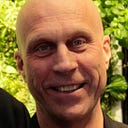A wild idea
- or what if?
An essay by Dickson Despommier
This week the leading spokesperson in the world for vertical farming and urban agriculture, Professor Dickson Despommier at Columbia University, delivers this brilliant essay. Read it and reflect — What if we could achieve our dreams?
What if humanity suddenly woke up one morning and collectively acknowledged that the natural world was indeed their sole life support system, and further realized that, lo these thousands of years, in blind ignorance, we have all been guilty of unwittingly destroying the very things that fostered our evolution out of the plains of East Africa. And what if humanity also suddenly connected all the dots and saw for the first time that rapid climate change was the symptom of an underlying malignancy caused by multi-national corporate greed and insatiable avarice of the very, very rich. To the vast majority of practical, level-headed, ROIers and bottom liners — (you know them all — successful entrepreneurs, hedge funders, international bankers, oil magnets, wildcat frackers, land developers, construction company executives, mineral exploiters, lumber company CEOs, commercial trawler outfitters, corporate boards of coal/gas/oil power plants, pesticide and herbicide manufacturers) — all this holier-than-thou “posturing” and tree hugging nonsense about partnering with the natural world sounds like a bunch of leftist political hooey. None of them believe in the conclusions reached by thousands of scientists on climate change and presented to the public by the International Panel on Climate, Change, the World Health Organization, the World Bank, … ok, ok, enough said.
For the moment, lets marginalize those nay-sayers who do not ‘believe’ in science by simply ignoring their cries of foul (by the way, science is not a belief system). What if we, the great majority, really did accept responsibility for all the damage we have brought down upon the countless defenseless creatures that stood in the way of our farms, suburbs and cities? How do you think the world would look if, from that moment on, everyone on the planet agreed to pitch in however they could to help all compromised ecosystems recover so that they once again became sustainable by simply leaving them alone.
Unfortunately, it is in our very nature, embedded deeply within the human genome, to encroach (i.e., to “Go where no man has gone before”!). If we see a sign that says Wet Paint, what do we do? You’ve got it right! We end up with that paint all over our hands. We just can’t seem to leave anything alone, no matter what the consequences. So leaving nature alone does not seem to be an option for a species that evolved rapidly through the use of technology and can now destroy anything it wishes to, including incoming asteroids and comets, if need be. But leaving nature alone is exactly what we must do if we are to survive in the long term. In fact, the only places that we are forbidden to enter have been set aside as the result of extreme environmental damage (e.g., Chernobyl, Ukraine; Fukushima, Japan), or as the result of a ceasefire treaty between North and South Korea (the demilitarized zone — DMZ). Each of these places has recovered ecologically, and the DMZ of Korea is now ranked among the most beautiful places on planet earth. How ironic. Perhaps we should declare war on all the natural world, then force it to surrender and disallow encroachment into the conquered territories.
Finding other ways to gratify our daily needs is what is actually needed. Ways that do not interfere with natural process. Learning how to recover all of our unwanted leftovers (waste water, solids, industrial “garbage”) would allow us humans the luxury of imitating nature at its best, while fostering a healthier life style for all those fortunate enough to live in the built environments that embraced this “radical” philosophy. Urban agriculture in all its forms holds out promise for supplying large swaths of humanity with their daily caloric requirements while at the same time permitting farmland to be abandoned, thus allowing natural process to heal itself back into its former ecological setting. As extreme an idea as this may sound, progress towards realizing the technical aspects of controlled environment agriculture (i.e., indoor farming) has been remarkable. We now have the means to implement multi-story indoor farms that are integrated into the very fabric of commercial downtown areas of densely crowed cities. Pasona 02 is one such building in Tokyo, Japan that may represent a bright future for a new generation of urban farms over the next 5–10 years.
We must first ask “What if” in order to insinuate a new way of thinking about our place in society. It all began with What if. What if we could fly? What if we could speak to anyone at any time? What if we could cure any disease? What if is the spring-board to unbridled imagination, unlimited creativity, and boundless invention. What if everyone had enough to eat and drink? What if we all lived in a world that allowed all of us to live long and prosper?
“What if” is the first step towards achieving those dreams.
A new way of thinking
The Business As Usual blog is managed by Plantagon. They stand for a new way of thinking and want to change the way we do business right now. Want to know more?
You can join the Plantagon Companization as a member today and be a part of shaping the future. Read more here!

